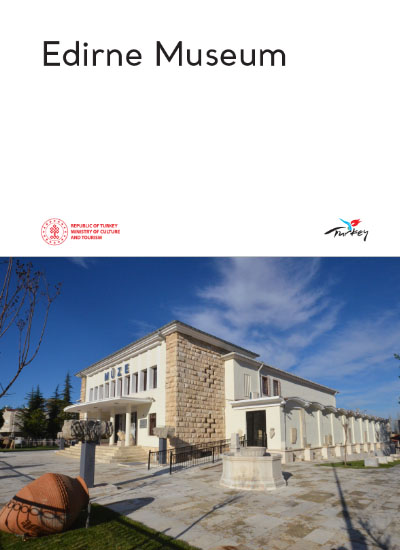Edirne Archaeology and Ethnography Museum has two sections and an additional section consisting of garden exhibits. Its construction started in 1969 and it was opened on June 13, 1971
The museum is located 50 meters away from the eastern gate of the Selimiye Mosque, right next to the area where tombstones from the Ottoman period are exhibited.
In the garden of the museum, the entrance section is arranged with Aeolian column capitals belonging to the temple from Enez; the southern section facing the Insect School is covered with artifacts belonging to water culture. The fish ponds and birdbaths of Edirne, which are related to the water culture of the Ottoman period, are also exhibited in this area.
The exhibition in the halls of the museum building consists of Archaeology and Ethnography sections. In the ethnography hall, where local clothes specific to the Balkans, different examples of calligraphy, carpets, rugs, Edirne Bride's Room, Living Room are represented, some of Mustafa Kemal Atatürk's personal belongings used during his trip to Edirne are also exhibited.
The exhibition in the archaeology section starts with fossils. There are parts of the defenses, jaw bones, teeth and vertebrae of rhinoceros and horse animals found in Edirne and its immediate surroundings.
Among the marble sculptures and steles, tomb steles depicting the Thracian Horseman are among the regional artifacts exhibited in the museum. Other artifacts found during excavations in Edirne are also on display.
The excavations and researches carried out since 1971-72 in Enez, an important port city established on the obligatory passageway where land, sea and river routes intersecting the Balkans, Anatolia and the Aegean in the early ages, show the development of the region from the prehistoric period to the present day. Figured amphoras, terracotta statuettes and ceramic artifacts, marble sculpture fragments, steles, various jewelry, which are the finds of the Enez excavations, which constitute an important part of the museum, are exhibited in this section.
Apart from the artifacts of the region seized from Kapıkule, İpsala and other border gates, various artifacts belonging to Anatolian civilizations are also exhibited in the museum. In addition to jewelry, terracotta and glass artifacts, sculptures, steles and coins are exhibited in showcases belonging to their periods.
EDİRNE ARCHAEOLOGY AND ETHNOGRAPHY MUSEUM


